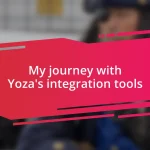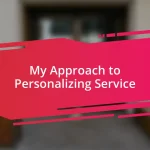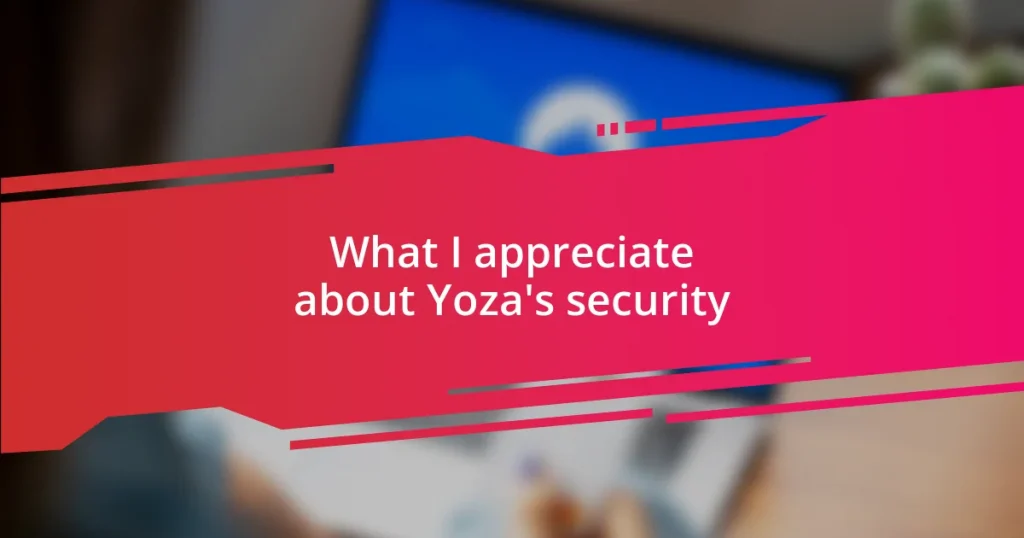Key takeaways:
- Comprehensive orientation and setting clear expectations help new agents feel supported and confident in their roles, fostering a smooth transition.
- Utilizing interactive training methods, such as role play and feedback loops, enhances agents’ learning experiences and builds team camaraderie.
- Encouraging continuous learning through flexible resources and recognition motivates agents to take ownership of their development and fosters a culture of growth.
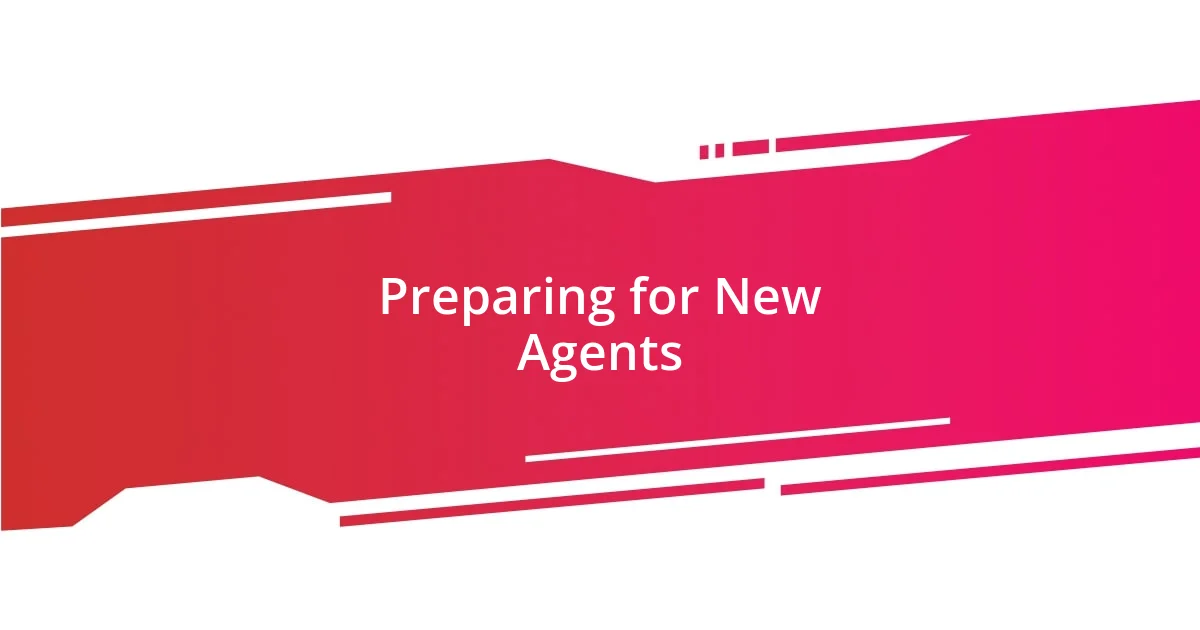
Preparing for New Agents
Preparing for new support agents requires careful planning and a genuine understanding of what they will face. I remember my own first day, filled with excitement and anxiety. Can you recall the mix of emotions you felt stepping into a new role? That’s why it’s crucial to create an environment where new agents can transition smoothly, feeling supported from day one.
I always found it effective to provide a comprehensive orientation that covers not just the technical aspects of the job but also the company culture. One time, I facilitated a “day in the life” session with a seasoned agent. Seeing that real-world perspective made the process feel less intimidating for newcomers. It’s moments like these that forge connections and set the stage for long-lasting camaraderie.
Moreover, setting clear expectations upfront gives new agents a sense of direction. I’ve seen the frustration that arises from ambiguity—have you witnessed that too? By sharing both the challenges and the rewards of the role, I equip them with a balanced perspective, paving the way for their success.
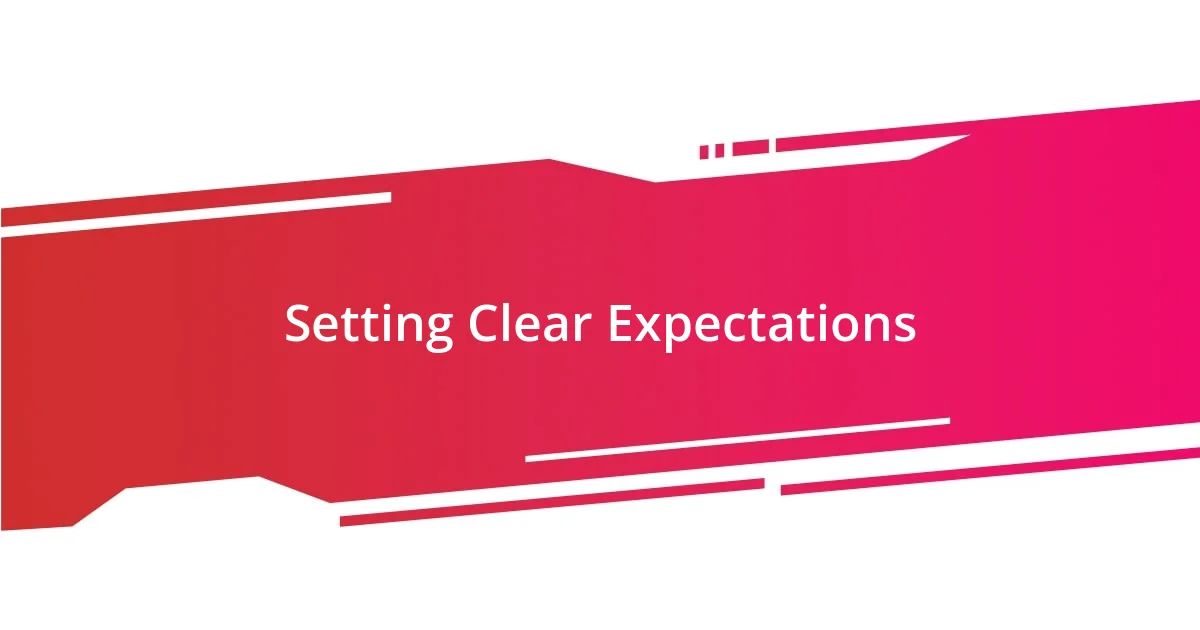
Setting Clear Expectations
Setting clear expectations is a foundational aspect of training new support agents. From my experience, beginning with an open dialogue about their roles can mitigate anxiety. I remember my first performance review—nobody had explained how they evaluated success. It left me feeling uncertain about what success really looked like. By explicitly outlining key performance indicators and daily responsibilities, I’ve ensured that new agents feel more confident and prepared to meet their goals.
I also emphasize the importance of communication. During my training sessions, I often tell new agents about my own journey—how early miscommunications could have easily been avoided with clearer guidelines. By sharing these stories, I’m able to relate to them on a human level. When they understand the “why” behind expectations, they’re more likely to embrace them wholeheartedly, creating a more cohesive team environment.
To further enhance this process, I implement regular check-ins to ensure expectations remain aligned. These touchpoints allow agents to voice their concerns and reflect on their experiences, which not only fosters growth but cultivates a supportive atmosphere. I’ve found that when agents feel heard, they are much more engaged and motivated to exceed the expectations set before them.
| Aspect | Traditional Approach |
|---|---|
| My Approach | Clear Communication of Roles |
| Follow-Up Frequency | Annual Reviews |
| My Approach | Regular Check-Ins |
| Performance Metrics | General Guidelines |
| My Approach | Specific KPIs Explained |
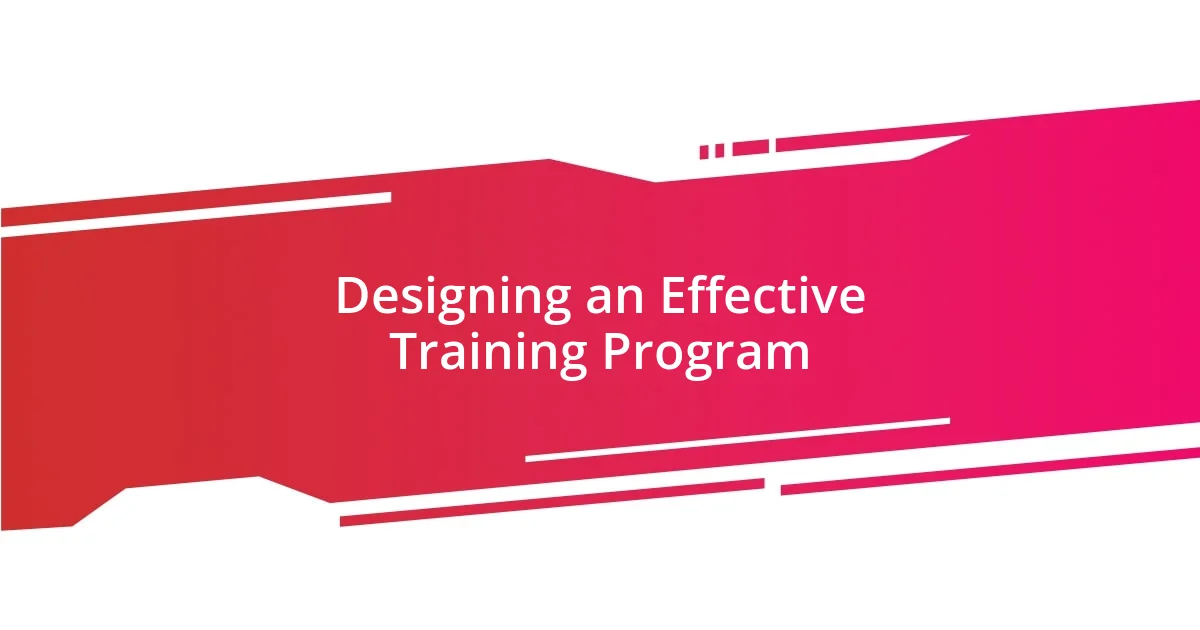
Designing an Effective Training Program
When designing an effective training program, I believe in the power of adaptability. Each agent has a unique learning style, and I remember an instance where one new support agent struggled with traditional instructional methods. Instead of sticking to a rigid format, I introduced interactive simulations that allowed the agent to practice real scenarios in a risk-free environment. Watching their confidence blossom as they navigated challenges upfront was a rewarding experience. By embracing flexibility, we can cater to diverse learning needs and foster a supportive training atmosphere.
To further enhance the training experience, I incorporate various elements that engage and motivate new agents:
- Interactive Learning Modules: Use multimedia resources that stimulate interest and encourage exploration.
- Role-Playing Exercises: Allow agents to take on different roles in customer interactions, enhancing empathy and understanding.
- Peer Mentorship: Match new agents with experienced team members for guidance and support.
- Feedback Loops: Create regular opportunities for agents to give and receive feedback to improve the training continuously.
- Recognition Programs: Celebrate milestones and achievements to motivate and instill a sense of belonging.
These components not only make training more engaging but also pave the way for a collaborative and dynamic work environment.
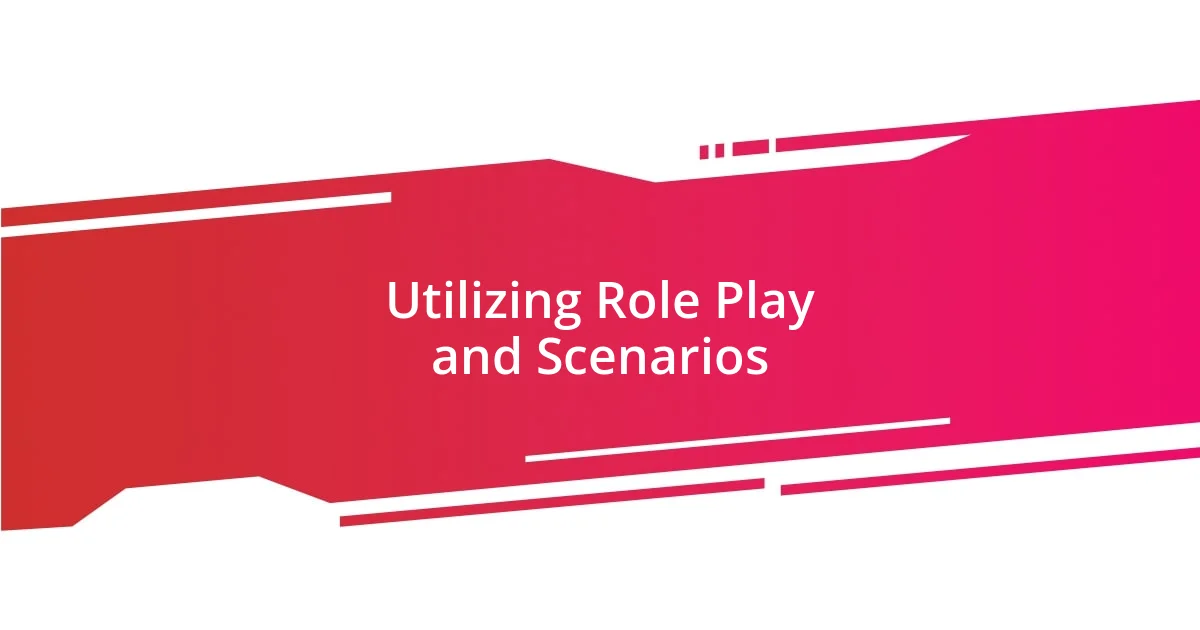
Utilizing Role Play and Scenarios
One of the most transformative tools I’ve used in training new support agents is role play. What I’ve found is that stepping into various roles allows agents to navigate customer interactions like they’re in a dress rehearsal. For instance, I remember a time when a trainee played the part of an irate customer. To see their eyes widen with genuine concern as they responded to every grievance was eye-opening for everyone involved.
Creating realistic scenarios not only builds confidence but also encourages agents to think on their feet. I can’t emphasize enough how powerful it is to engage in real-world situations—essentially, it’s practice without the pressure. I often design these scenarios around frequent customer inquiries or hypothetical escalations. Each session ends with debriefs where agents can discuss what felt right and what could be improved, fostering an atmosphere of collective learning.
There’s an undeniable sense of camaraderie that forms during these exercises. I recall once when a group of agents collaborated on a particularly tricky case scenario. Their laughter over missteps turned into insightful discussions about empathy in customer service, which made me realize the importance of these role-playing sessions. It’s moments like these that not only prepare them for real calls but also create a tight-knit unit ready to support one another. Have you tried implementing role play in your training? If not, I highly recommend giving it a go; you might be surprised at the energy and insight it can bring to your team.
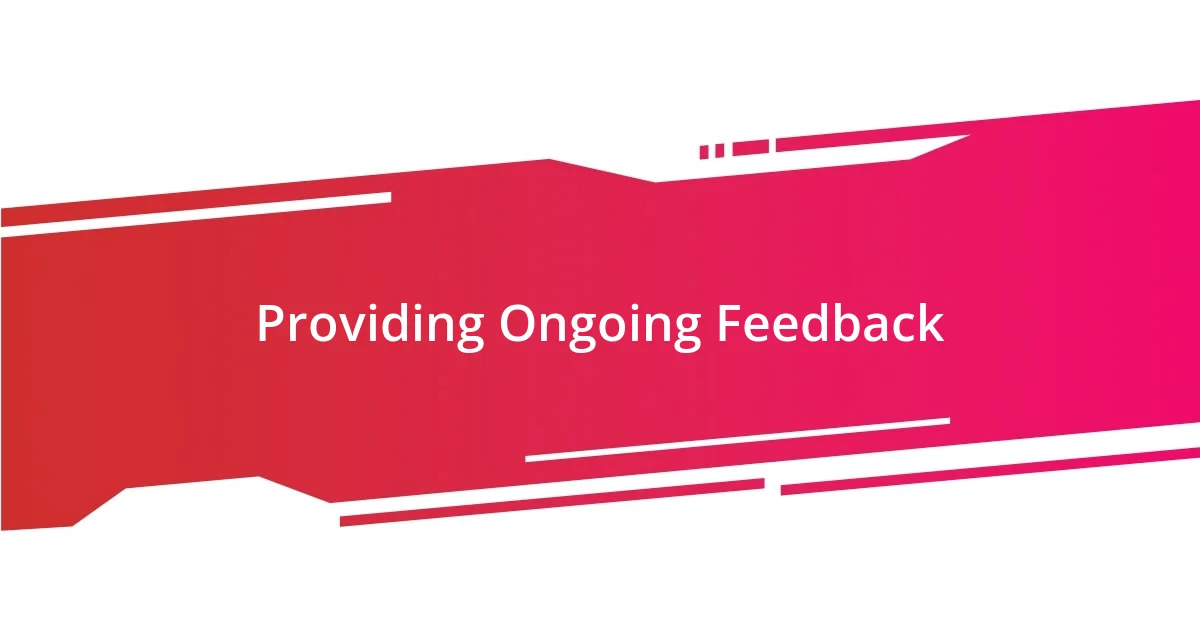
Providing Ongoing Feedback
Providing ongoing feedback is an absolute game-changer in training new support agents. I remember a particular instance where I scheduled a weekly one-on-one check-in with a new agent who was feeling overwhelmed by their responsibilities. By sharing constructive criticism and positive reinforcement during these sessions, I noticed a remarkable shift in their confidence and overall performance. Have you ever experienced the power of a simple conversation in turning around someone’s day?
Another aspect I emphasize is the importance of real-time feedback after practice sessions. I recall an agent who struggled with handling customer complaints; during our debrief, I pointed out specific moments where they excelled while also identifying areas to improve. This approach not only made our discussions more meaningful but also allowed them to have immediate clarity on their progress. It’s fascinating how quickly things can change when you feel supported, isn’t it?
Lastly, incorporating peer feedback into the mix can add another layer of enrichment. One time, I facilitated a session where agents reviewed each other’s calls and offered insights. The interaction and exchange of support were fantastic. It made me realize that ongoing feedback is not just about the trainer or manager—it’s also about building a network of encouragement among agents. I genuinely believe this collaborative environment helps create a self-sustaining culture of growth and improvement. Have you considered encouraging peer involvement in feedback? It could be the missing piece in your training strategy!
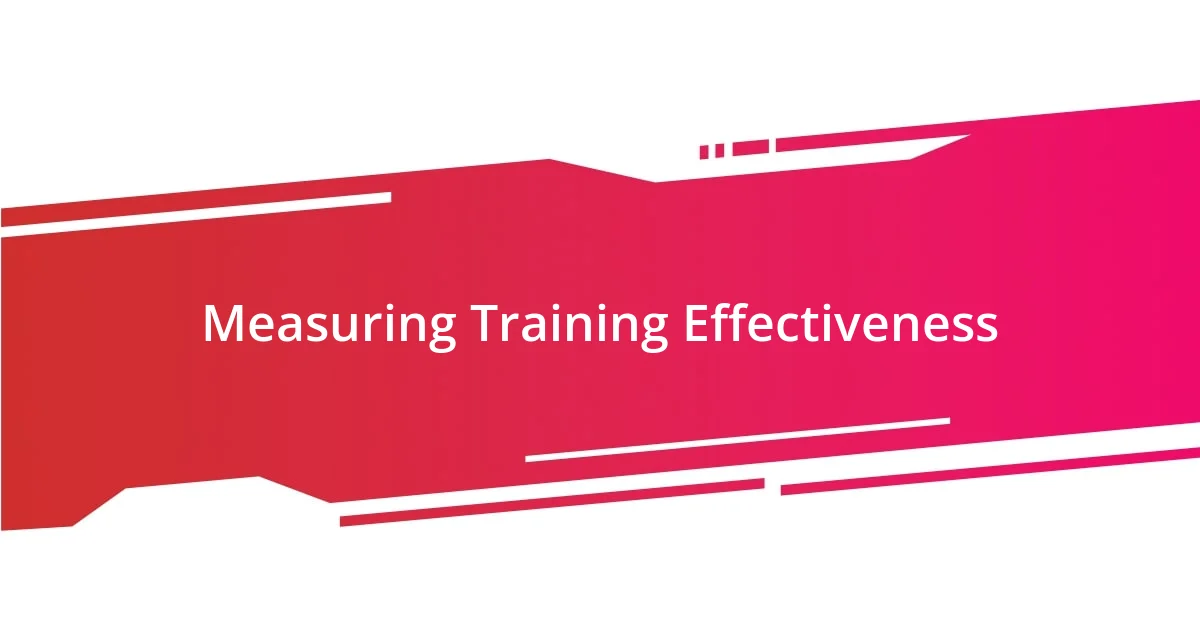
Measuring Training Effectiveness
Measuring training effectiveness can sometimes feel like a daunting task, but I’ve discovered that it’s really about observing change and understanding impact. After completing each training module, I like to conduct short surveys where agents reflect on their learning. It’s fascinating to see how their responses evolve over time; I recall a moment when one agent excitedly exclaimed, “I never thought I could handle that situation!” This immediate feedback is like a pulse check on the training’s success.
Moreover, I closely monitor performance metrics post-training. I remember a specific instance where an agent managed to reduce their average call handling time by 20% after our role-playing sessions. It’s rewarding to see tangible results, and it certainly validates the effort put into training. Tracking these metrics allows me to adjust my approach. After all, if something isn’t working, why not pivot?
Finally, I often encourage trainees to set personal goals and reflect on their achievements after a training cycle. I recall asking one of my agents, “What did you find most impactful?” Their response led to a thoughtful discussion on the skills they wanted to hone further. This self-reflection not only fosters accountability but also empowers agents to own their learning journey. Have you ever noticed how powerful journaling or goal-setting can be? It’s a game changer in measuring their progress and understanding the deep-rooted effects of your training efforts.
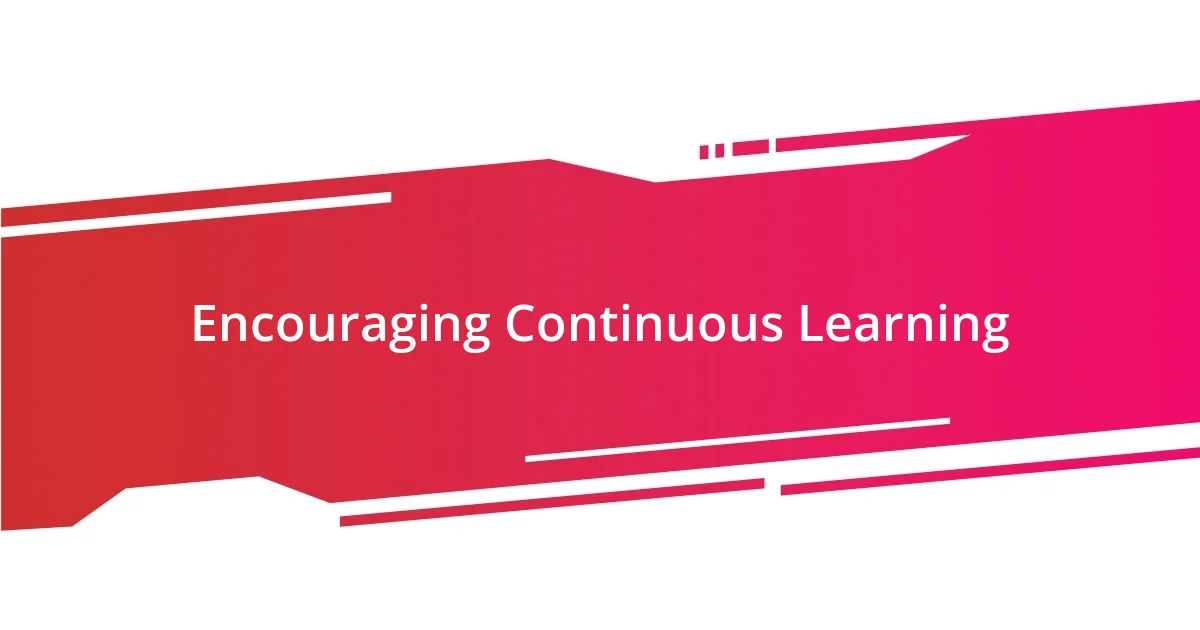
Encouraging Continuous Learning
One of the most exciting parts of encouraging continuous learning is creating a culture where curiosity thrives. I remember when I introduced “learning hours” in our weekly schedule. Agents could take time to explore new tools or skills; during those sessions, I observed them sharing insights with each other. Isn’t it amazing how a little freedom to explore can spark innovation among the team? Watching them take charge of their learning and even discuss recent discoveries filled me with pride.
In my experience, fostering continuous learning often means providing various resources and learning formats. I once noticed an agent who preferred visual content over traditional reading materials. So, I encouraged them to dive into instructional videos, and the transformation was remarkable. They absorbed complex concepts effortlessly! Have you considered catering your training materials to different learning styles? It’s a straightforward change that can significantly boost engagement.
Finally, incorporating recognition for continued learning can be a powerful motivator. I introduced a monthly “Learning Champion” award to celebrate those who actively sought out knowledge beyond their basic training. One of our agents, who initially lacked confidence, received the award for the first time, and you could see the joy in their eyes. That little acknowledgment inspired not just them but others to pursue their interests more passionately. Isn’t it incredible how a small gesture can ignite a collective drive for growth?








